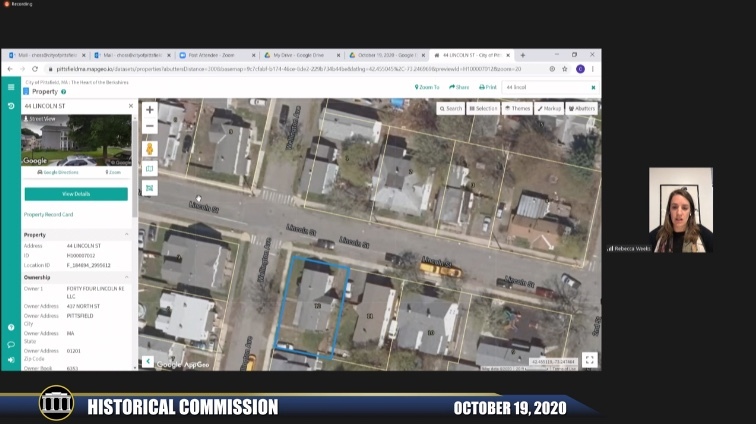
Pittsfield Historical Commission OKs Demos in Morningside Area

PITTSFIELD, Mass. — The Historical Commission approved Kellogg Properties and Mill Town Capital's applications to demolish four buildings in the Morningside area.
A number of these buildings have been vacant for some time and all have structural issues that make them unlivable such as damaged heating systems, poor roofing, water damage, foundation issues, and mold infestation.
Mill Town's first applications for demolition were for the abutting structures on 10 Winter St., 27 Curtis St., and 33 Curtis St.
These properties are not a group, but are all more or less the same shape and size. The commission agreed that the buildings don't host any significant architecture or historical significance.
Project representative Rebecca Weeks, who co-founded and leads Blueprint Property Group, explained that these properties have been stripped of all of their piping, their heating systems aren't working, the roofs are in bad condition, and the foundations are not sound.
At this point, fixing these buildings would be difficult because of the water damage that was done, she said.
Weeks described 10 Winter as somewhat of a health hazard because though it is boarded up, there has been a lot of squatting in the building and there are two porches in the back that are not structurally sound.
This property was purchased vacant and remains vacant.
Mill Town has recently purchased an adjoining property to these and, in the long run, would like to acquire more surrounding properties for a larger project in the block of Curtis Street.
The investment group is working on a $10 million residential housing build on Tyler Street that takes precedence over this project, but is demolishing these buildings in consideration of the safety of people in the area.
The Curtis Street properties were not well managed prior to purchase. The condition of the buildings were not able to be fixed with tenants in them as there were open flame heating systems, so the tenants were moved into better situations to protect their well-being and get the buildings vacant.
"I think Winter Street is really coming along, personally," Weeks said. "There's a lot of great neighbors and a lot of great people looking out for these properties, helping us out and letting us know of any issues."
Weeks says it would be great to be able to add new housing to the neighborhood and increase the values of surrounding homes. She said Winter Street has come a long way with the help of Ray Crow Park on Winter Street, which yields a large playground and open space for activities.
If approved, the buildings will be demolished before winter. There is no drawing of prospective projects for this space, but Mill Town estimates that it would be a similar build to its residential multi-family structures in progress on Tyler Street.
Caroline Holland of Mill Town Capital proposed a project for 44 Lincoln after the demolition of the structure.
Mill Town purchased this property about a year ago. The 1910 duplex has been vacant for some time and has been in disrepair, falling on and off the Massachusetts Property List that flags problem properties.
The foundation is old and bulging in several places along with a problematic amount of water coming in through the soil floor.
Additionally, an exceptional amount of rot is happening on the shingle-style outer casing of the structure. There is also significant damage to roof and the bottom unit interior is unsanitary because of soft floors and mold.
"Unfortunately, it is not a good space for people it reside in anymore." Holland said.
The Historical Commission could not find any records of historical happenings or residents in this property and it does not yield any historical architecture.
The primary motivation for this demolition is to create community space. This aligns with Mill Town's community development goals and fits the needs for the surrounding area.
"After exploring various options and better understanding the state of disrepair and the enormous investment it would take to bring this structure back," Holland said. "We realized that the best path forward would be to create green space in the neighborhood."
Mill Town worked with Morningside Community School, the Morningside Initiative, Habitat For Humanity, and other grassroots community organizations to create this concept and flesh out the possibility of some green space or a small park on this lot.
Green space is limited in this neighborhood because it is densely packed, Holland explained. Additionally, there are many children who attend Morningside School and families who would benefit from it.
Tot Spot day care is also two doors down and Holland said it has recently expanded and is "bursting at the seams."
This project would offer an outdoor space for the whole community. Working with the community groups and residents, Mill Town representatives said the company made sure this would resonate with them and that they are all very excited.
If everything goes smoothly, the plan is to have a park in place by spring.
Holland said they would be open to any sort of future beyond the park and would consider another use for this property if it better fits the community.
Mill Town is invested into bettering the community, she said, not just tearing down buildings. It also purchased a long vacant property across the street from 44 Lincoln that will be renovated into functional housing.
"We are long term committed to creating positive change in this very small intersection hopefully growing out over the years to the whole neighborhood," she said. "This is a slightly bigger picture. It's not just the park, it's also looking to added quality residential sites to this neighborhood as well."
Tags: demolition, historical commission,















